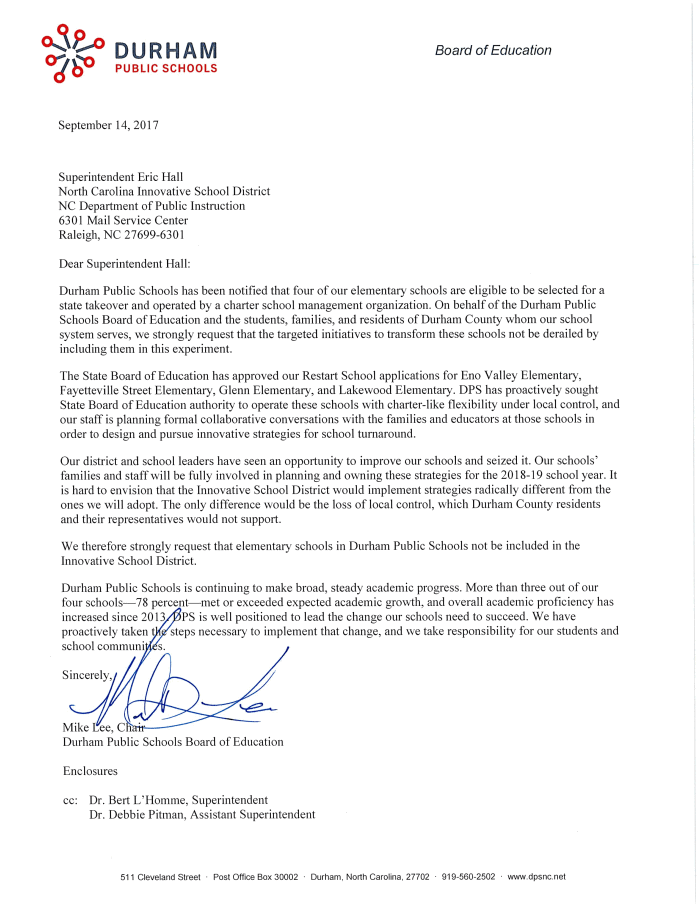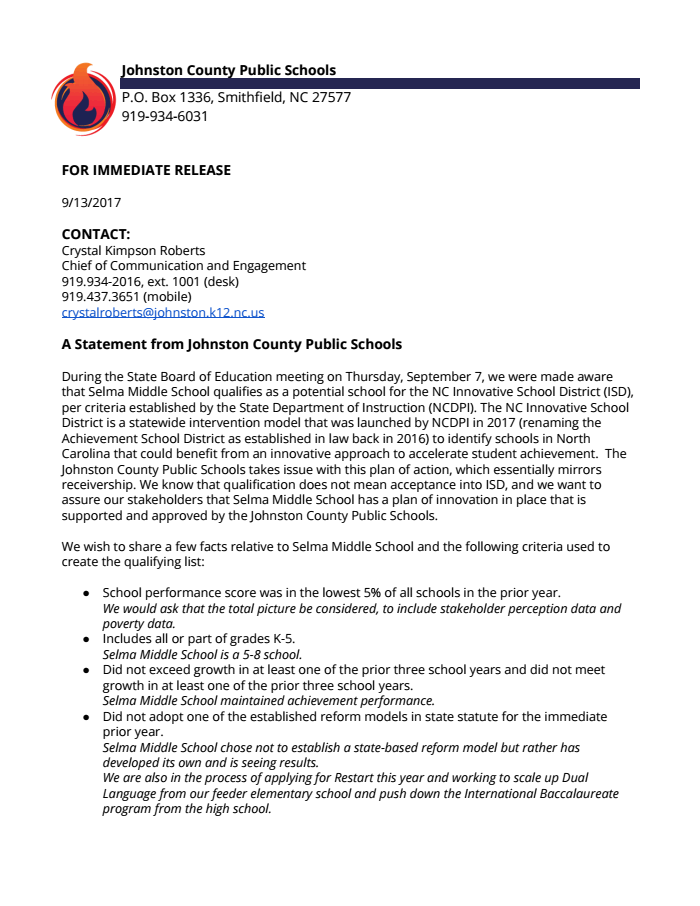Durham, Johnston schools ask to be excluded from NC's new Innovative School District

As state education leaders try to decide which low-performing public schools should be part of North Carolina's new Innovative School District, school leaders in Durham and Johnston counties have one message for them – don't pick us.
The state recently released a list 48 schools being considered for the Innovative School District. The ISD, formerly known as the Achievement School District, will take five struggling schools from across the state and hand them over to charter school operators, who will manage and run the schools in an effort to improve their academic performance. Two schools will be chosen this year, and three next year. (See the full list of eligible schools below.)
Several Durham County schools and one Johnston County school are among the 48 schools being considered, but leaders in those two districts say they "take issue with this plan of action" and don't want to be included "in this experiment." Their schools are being considered because their performance scores are among the lowest 5 percent in the state.
In a letter to the North Carolina Department of Public Instruction last week, Durham's Board of Education chairman said the district is already working "to design and pursue innovative strategies" to improve their low-performing schools and asked that they not be included in the ISD.
"(W)e strongly request that the targeted initiatives to transform these schools not be derailed by including them in this experiment," DPS board Chairman Mike Lee wrote, adding that Durham County residents would not support the "loss of local control" if the ISD took over any of their schools.
Schools chosen for the ISD will be turned over to charter school operators, which means their local school boards will no longer have a say in the staffing, instruction or other educational matters at those schools. However, the school boards will still be responsible for maintaining the buildings, making sure they have the appropriate furniture and equipment and continuing to provide transportation for the students.
Johnston County Public Schools shared similar concerns last week after discovering that one of its schools, Selma Middle, was being considered for the ISD. A district spokeswoman emailed the media to say the district "takes issue with this plan of action, which essentially mirrors receivership."
"Our school district has the fullest confidence that our current principal will continue making the upward shift begun by our previous principal," according to the district's statement. "We ask that the state consider allowing Johnston County Public Schools to continue working and show our results."
'Turf wars' possible, but partnership preferred
ISD Superintendent Eric Hall said he has heard similar feedback from some of the other 21 districts across the state that have schools under consideration, but he was unable to say how many have asked not to be included. However, just because a district asks not to participate doesn't mean it will be removed from consideration.
"You know, in a perfect world, it would be great of course if everybody was willing to participate," Hall said. "I think the task that I have to stick to and stay focused on is, in the end, what do we need to do to ensure the success of the students and the schools. For me that’s going to be front and center."
The school districts' reactions are not surprising. Lt. Gov. Dan Forest predicted the pushback last year, saying he expected "some turf wars" between the ISD and local school systems but said the "calculated risk" was necessary to help low-performing schools.
Hall, who became ISD superintendent in May, is hoping to avoid those turf wars and said he wants to work in partnership with local communities to help choose charter operators to take control of the schools.
{
"name": "sidebar",
"attrs": {
"src": "sidebar-16955259"
},
"children": null
}"We will have a process to ensure that community voice and community representation is involved in that matching," he said. "My goal is not for us to just pick somebody from sitting here at the office based on an application. Our task is how do we look at what we know the school needs and what the values of that school community really are and match an operator that’s going to match those values."
Hall said he has heard from three or four nonprofit charter entities that are interested in working with the ISD. More will likely contact him in the coming months as the schools are chosen.
In the meantime, he is reviewing the eligible schools' test scores and other performance data and plans to present a shorter list of schools he is considering at next month's State Board of Education meeting. The board will ultimately be responsible for choosing which five schools participate, and the first two could be selected by November or December.
The list of eligible schools has already gotten shorter. Last week, Hall removed seven schools from consideration after discovering they were already receiving federally funded school improvement grants.
"Those (federal) funds would likely be lost if they were transferred into the Innovative School District," Hall said. "We would not want to see resources like that diminished in a school that we already know has significant needs."
The seven schools removed from consideration for the ISD are:
- Brogden Middle – Wayne County
- Carver Heights Elementary – Wayne County
- Eastway Elementary – Durham County
- Vick Elementary – Wilson County
- Ashley Academy – Forsyth County
- Kimberly Park Elementary – Forsyth County
- Bruns Academy – Charlotte-Mecklenburg County
That leaves 41 schools still eligible. Not everyone has been averse to the ISD, according to Hall, who has been talking with school district leaders across the state. He recently met with the Robeson County school board, which has five schools being considered, and said they asked good questions and seemed open to the discussion.
"Of course, there’s going to be different reactions," Hall said. "There’s been some school board members in places where I’ve been meeting and talking with folks that are very intrigued and very interested in learning more about, OK, what can we do to help improve outcomes for kids. In the end, I think the common denominator is everybody wants to see students get better."
Durham schools seek exception
North Carolina lawmakers set up the ISD as a pilot program. It's designed to last five years with a possible three-year extension if a school needs more time to make improvement. Once the state board selects a school for inclusion in the ISD, the local board of education that runs the school has two options – agree to relinquish control of the school or close it down.
The legislation also gives school systems that participate the opportunity to pick up to three other low-performing schools in their district to join an Innovation Zone. Schools in this zone would have charter school-like flexibility but would continue to be managed by the school district.
Schools selected for the ISD must meet certain qualifications. One condition is that it must not have already adopted one of the state's school improvement models. Any school with an improvement plan approved by the state board by June 30 cannot be considered for the ISD.
Four Durham schools being considered for the ISD had their improvement plans approved after June 30, but Durham school leaders are hoping Hall will remove them from his list. In an interview with WRAL News, Hall praised Durham and other districts for seeking new ways to improve their schools but said, by law, he can still consider them for the ISD because their school improvement plans were approved after the cut off date.
"I don’t think anybody’s jumping up and down and saying, ‘Pick me, pick me,'" Hall said. "I do understand why a district may express concern. I mean, this is something new. This really is. It’s a brand new strategy in our state. But it’s also a brand new opportunity to look at how do we really create a model that I think others can follow in how state and local communities partner together to improve outcomes for kids."
Schools eligible for NC’s Innovative School District
{
"name": "footable",
"attrs": {
"id": "16933464",
"identifier": "ISD2",
"sortable": "false"
},
"children": null
}













